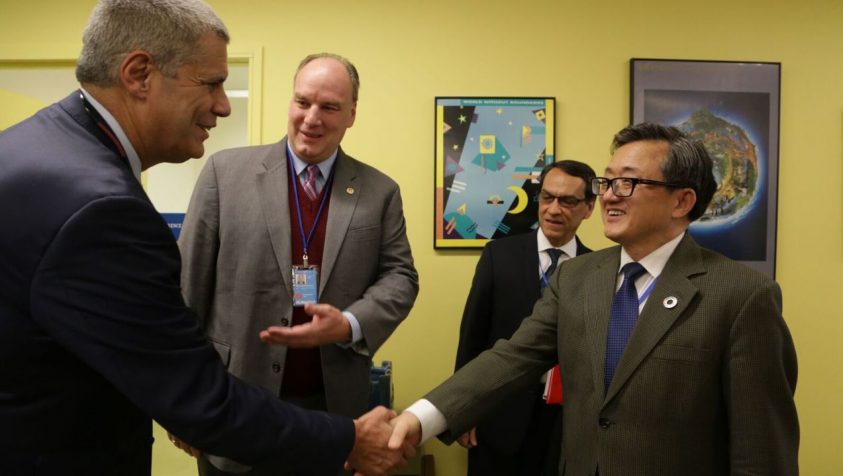New partnership to explore sustainable water and energy solutions
A novel partnership to find solutions to globally pressing energy and water challenges was launched on 7 March by UN DESA and the bi-national company ITAIPU Binacional (Brazil-Paraguay) at UN Headquarters in New York. The new partnership, the “Sustainable Water and Energy Solutions partnership initiative,” will work over an initial four-year period to promote water and energy sustainability and other Sustainable Development Goals in support of the 2030 Agenda for Sustainable Development.
Energy and water are closely interlinked and interdependent, with about 90 per cent of global power generation being water intensive, while about 8 per cent of the global energy generation is used for pumping, treating and transporting water to various consumers. Both energy and water are used in the production of crops, including those used to generate energy through biofuels.
Growing populations and economies place additional demands on water and energy, while several regions around the world are already experiencing significant water and energy shortages. Today, 1.1 billion people lack access to electricity, while water stress is affecting more than 2 billion people. By 2035, energy consumption will increase by 50 per cent, which in turn will increase the energy sector’s water consumption by 85 per cent.
“We are honoured to have the opportunity to work with Itaipu Bi-national, which is an inspiring example on how two countries could work together in a peaceful and harmonic manner to provide reliable and clean energy to all their citizens,” said Mr. Liu Zhenmin, UN Under-Secretary-General for Economic and Social Affairs. “Itaipu’s success stories represent best practices in the implementation of the sustainable development goals. This partnership initiative, that we are launching here today, will allow us to further strengthen capacity building for effective and sustainable water and energy solutions for all.”
The partnership aims to become a global sustainability network on SDG6 (Water) and SDG7 (Energy) interlinkages, with a large number of members from all regions and constituencies, including governments, businesses, civil society and international organizations. The ultimate goal of this partnership is to provide a platform for all stakeholders to enhance capacities and signal their high-level commitment to support the implementation of SDG6 and SDG7 in a holistic manner.
“The partnership between Itaipu and UN DESA is much more than a partnership between an electric company and a UN organization. Itaipu, by itself, is already a successful partnership between two countries that have joined efforts to transform the waters of the Parana River into energy. So, we see this cooperation with UN DESA for the implementation of SDGs 6 and 7 as a partnership that will be equally successful,” said Mr. Luiz Fernando Leone Vianna, Brazilian General Director of Itaipu.
The Sustainable Water and Energy Solutions partnership will build capacities, dialogues and cooperation for addressing water and energy interlinkages for sustainable development. The partnership will also identify the key barriers and opportunities for integration, and work collaboratively to identify and drive key actions to address them. Such actions will include sharing good practices, developing capacity and promoting specific innovations through enhanced international cooperation.
“We are very pleased with this opportunity to work together with UN DESA in order to promote the 2030 Agenda and, in this case, SDGs 6 and 7,” said Mr. James Spalding, Paraguayan General Director. “Itaipu not only focuses on clean and renewable energy generation, but also has a strong track record in corporate social responsibility as well as environmental conservation. We look forward to this strategic alliance with UN DESA and have no doubt of the positive and concrete results.”
The 2030 Agenda for Sustainable Development recognizes the centrality of energy and water resources to sustainable development, and the vital role that improved access to both water and energy play in advancing progress in other areas, including health, education and poverty eradication. An integrated approach to water-energy interlinkages can increase energy efficiency, decrease water pollution, reduce costs of energy and water delivery, increase access to services, and reduce greenhouse gas emissions.
ITAIPU Bi-National is a global leader in clean, sustainable and renewable energy production and has been recognized as a prominent example of binational cooperation and partnership for sustainable development since the beginning of its operation in the 1970s. ITAIPU has become one of the main drivers of economic and social development of the border region between the two countries. Working directly at the intersection between energy and water, ITAIPU is a leading example of innovation in the water-energy nexus, as demonstrated through its “Cultivating Good Water” programme, which won the ‘Water for Life’ UN-Water Best Practice Award in water management in 2015.
UN DESA holds up the development pillar of the UN Secretariat. Based at UN Headquarters in New York, its nine Divisions work together towards a common goal to promote development, together with its Capacity Development Office. UN DESA’s work promotes and supports international cooperation in the pursuit of sustainable development for all. It addresses a range of cross-cutting issues that affect peoples’ lives and livelihoods, especially the most vulnerable, having as a foundation the 2030 Agenda for Sustainable Development and the 17 Sustainable Development Goals (SDGs) supported by the Addis Ababa Action Agenda.


Follow Us